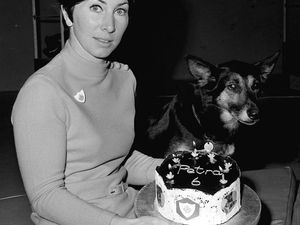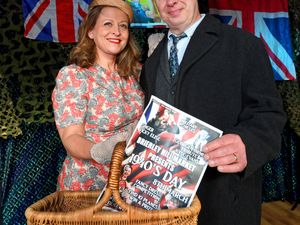Kirsty Bosley: Christmas hits are irrelevant and there's just one person to blame
Despite being a massive music fan, I don't know off the top of my head what made Christmas number one last year.

I don't know what's on course to top the charts this year and I don't know what happened the year before last either.
That doesn't mean I'm uncool now, or that I'm not 'down with the kids'. It doesn't mean my finger isn't on the pulse anymore either (though it probably isn't). It's simply that the Christmas number one is now about as relevant to the masses as what veggie option I'm having on the big day.
Who sells more than anyone else in time for December 25 matters to absolutely no one except for the record execs who want to tally up what remains of the big bucks. And that doesn't equate to much any more, sadly.

Long gone are the days when we'd huddle around the radio to hear if our favourite song had triumphed; the purchased single safely in hand like a ballot paper to prove that we've contributed. That we are intrinsic to the system.
I remember listening to the 1999 chart show, just days away from what might have been our final night on Earth before Millennium doom and destruction claimed us all. I'd tuned in to hear if Westlife (who I loved) were going to be able to keep Cliff Richard (who I hated) from the top spot. I despised Cliff's Millennium Prayer – how lazy it was and how rubbish it sounded – and much preferred Westlife's similarly lazy cover of ABBA's I Have A Dream.
I too had a dream, you see. And that was for one of the best groups in pop music history to reign supreme again. ABBA Gold was the first ever CD I owned, and I loved, and still love, that song. Westlife were attractive, I was a teenager, and the whole thing added up to something worth tuning in for just before 7pm on a Sunday night. Westlife reigned supreme, and I was joyful. In your face, Cliff!
We didn't perish and die on New Year's Eve, and the following year, karma was waiting for me beside the radio to kick my Westlife-loving bum, hard. The Irish babes were once again going for the top slot, but this time, their adversary was not a sinewy, tennis-playing pop star who once sang about keeping a girl locked up in a trunk. Gross. It was someone who was popular among a much younger audience. It was someone who does a lot to help his community and has many genuine friends who adore him. It was a man with a man's job, goddamnit. Hand calluses and all.
Bob the Builder's Can We Fix It, the notably unfestive song based on the cartoon opening theme, was jockeying for position. Westlife had released What Makes A Man in the bid to keep the illustrated tradesman off the top spot, but on the big night, they just couldn't do it. They'd posed the question: What Makes A Man? And the public answered: a primary-coloured masonry expert voiced by Neil Morrissey off Men Behaving Badly, that's what.
After that, my interest waned, greatly. By 2002, products of Simon Cowell's pop machine began claiming the crown almost every year. The race to the top became boring as acts such as Matt Cardle did a number on Biffy Clyro's Many of Horror and Alexandra Burke took Leonard Cohen's Hallelujah and bludgeoned it until it was dead.
Angsty anti-talent show activists pushed back in 2009, sending Rage Against The Machine's ace track Killing In The Name to the dizzying heights of number one. By that point, even as a Rage fan, it didn't matter. It didn't feel like sticking it to the man at all, because the charts had ceased to matter. Who cares? Fans of Cowell's created pop were obviously still gobbling it up as quickly as X Factor and Pop Idol could shovel it down their throats. It was still unarguably popular, even if it wasn't cool to admit it.
Even now people complain that manufactured pop has killed the charts. But are they forgetting Bob? Who was quite literally drawn with a pen and some felts? Or Mr Blobby, whose self-titled single topped the charts in 1993? He was precisely manufactured pop – if you watch him now in high-res, you can even see the stitches in his vinyl seams. Manufactured pop has never been a problem before, and it's not the problem now.
The problem is that it just doesn't matter. There are so many channels on which to listen to music, and so many genres from which to choose, the pool is too diluted to be relevant. Gone are the days of popping to the record shop to buy a single, sadly. Songs are no longer just pumped out on the pop shows across a handful of terrestrial channels.
It's strange to think that pop music will never again be as important in our festive traditions as a nation. In 1984, both WHAM! and Band Aid were up for the biggest-selling single title, with Do They Know It's Christmas pipping Last Christmas to the post. Two of the best Yuletide songs of all time, in the same year! Until such time as shops are all socially irrelevant and replaced by monotonous warehouses that we order from online, WHAM! and Band Aid will blare over shop speakers every year.
To quote the great Morrissey, Smiths singer not actor, (who has never and probably will never make Christmas number one): 'the passing of time, and all of it's crimes is making me sad again'. It wouldn't feel so depressing if we were replacing old, positive traditions with new ones. But it seems like the only things that have surged into popularly in the last few years have been things like Black Friday, trolling and selfies.
Who reaches Christmas number one is now not as important as what Kim Kardashian is wearing to the supermarket. And it's just a sign of the times, isn't it? This is no one's fault but ours. We can't complain, we just have to sit back and watch it unfold.
I will have my earphones on when it happens, listening to ABBA and fawning over Shane from Westlife. Some things never really change.




